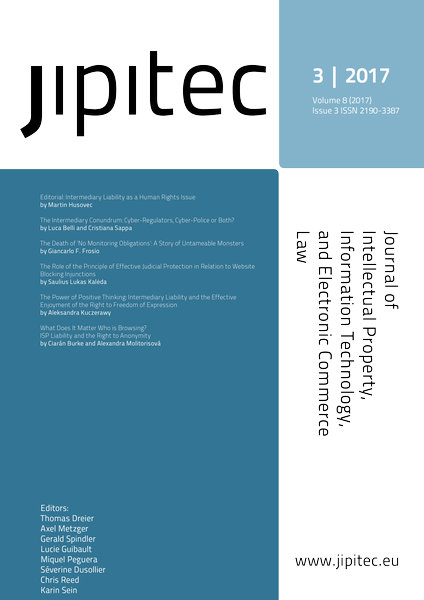The Role of the Principle of Effective Judicial Protection in Relation to Website Blocking Injunctions
Keywords:
Copyright enforcement, injunctions, judicial protection, online intermediaries, website blockingAbstract
The use of internet blocking to prevent access to illegal content requires the adoption of rigorous procedural safeguards. The necessity of such safeguards is even more pressing when this primarily public tool is transposed into the domain of private enforcement, for the purposes of supressing copyright and trademark infringements. Injunctions in the sphere of IP rights are governed by a net of interrelated EU legal provisions, contained in the Infosoc and the Enforcement directives (2001/29 and 2004/48), the E-Commerce directive (2000/31), and the EU net neutrality (open internet) rules (Regulation 2015/221). However, the core requirements stem from the application of the principle of proportionality and the search for a balance between competing fundamental rights. According to case law of the EU Court of Justice, the limitations upon injunctions in relation to IP rights are deduced in the process of balancing the substantive fundamental rights enshrined in the EU Charter: on the one hand, the right to the protection of intellectual property (Article 17(2)); and on the other, the freedom of expression and information (Article 11), the freedom to conduct business (Article 16), and the rights to privacy and to data protection (Articles 7 and 8). However, in relation to new types of injunctions potentially affecting the rights of multiple third parties, such as blocking injunctions, more weight should be given to procedural fundamental rights stemming from Article 47 of the Charter. This new perspective presents several advantages. Limitations resulting from Article 47 of the Charter constitute a stronger imperative than those deduced from the application of the principle of proportionality. To a large extent, they must be applied by the court of its own motion. In contrast to the principle of proportionality, fair trial requirements form part of European and national public policy provisions, potentially limiting mutual recognition of judicial decisions imposing injunctions. In the absence of harmonisation, the application of Article 47 of the Charter could therefore lead to the establishment of a minimum procedural standard, which can be invoked in order to achieve a certain degree of uniformity. This would be particularly important if blocking injunctions were to be used on an EU-wide basis.Published
2017-11-30
Issue
Section
Special Issue: Intermediary Liability as a Human Rights Issue

